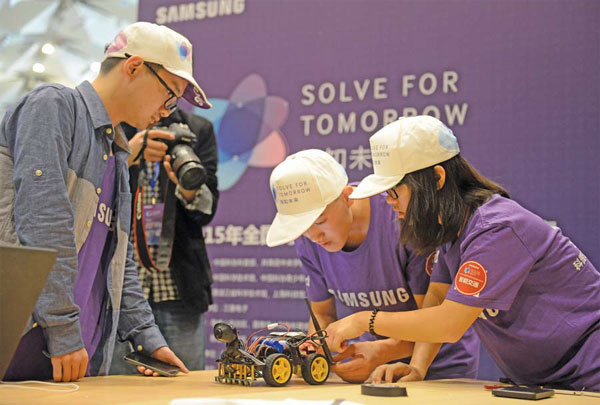Invention contest fosters creative young minds
Brainwave-controlled wheelchairs, automatic gesture-translation gloves and solar power smart houses - all are inventions by teenagers for a Chinese innovation competition.
More than 15,000 teams formed by 60,000 students have taken part in the National Youth Scientific Innovation and Experiment Contest since 2013.
The program was launched by the China Association for Science and Technology and the Central Committee of the Communist Youth League of China, and is supported by Samsung.
|
Competitors at the National Youth Scientific Innovation and Experiment Contest in Shanghai last year. Photos Provided to China Daily |
The fourth contest, which started on July 29, has a special focus on energy conservation, environmental protection and health.
"What's more important is that the experience of taking part in such competitions will greatly improve the students' confidence and awaken their consciousness of self-learning, which will have a huge impact on their studies and future direction," Wang Youyan, vice-president of Samsung China, said at the opening ceremony.
He added that the contest aims to spread scientific innovation education and cultivating young, energetic talent.
In the past three years, the contest has witnessed growth in young people's creativity and enthusiasm in addressing social issues.
Entries in 2014 included a cloud-based PM2.5 monitoring, disposal and forecasting system, and a portable battery charger powered by hydrogen fuel that can top-up three smartphones at once.
Some contestants have become even more enthusiastic about scientific innovation after taking part in the contest.
Lyv Xiaobo, a college student in Henan province, discovered his passion for scientific innovation after last year's contest, in which he came fourth with a wind power utilization innovation. This year, he presented a robot made from pull-top cans that can wave its hands, walk and dance.
"I wasn't used to wearing glasses, but now I do - a result of staying up to do experiments," he says. "But I don't regret it because scientific innovation excites me."
Lyu's not just keen about scientific innovation, but also education. He works as an assistant at Jiaozuo Science and Technology Museum, where he organizes activities for students.
"I've found out what I love through the contest, and I will always challenge myself and persist for the rest of my life," he adds.
Chinese youngsters are renowned for scoring well in science and mathematics exams. The Chinese way of teaching math is even now being tried out in Britain.
However, the system is often criticized for failing to encourage creativity.
Du Yungang, a professor at Inner Mongolia University of Technology, had 20 teams in the contest last year, including one that won its category.
"The subjects are closely related to daily life, so some of the entries have really good prospects for improving our lives," he says.
He adds that he appreciates the support of his university and industries to boost scientific innovation and education, and hopes "more companies will join in the cause".
As usual, this year's contest consists of two categories: creative works and scientific educational experiments. In the former, contestants are encouraged to come up with creative solutions to everyday problems. In the latter, contestants are given specific topics, such as intelligent transportation, wind power utilization and security.
Zheng Jinqiang and Wang Keju contributed to this story.
yandongjie@chinadaily.com.cn



















